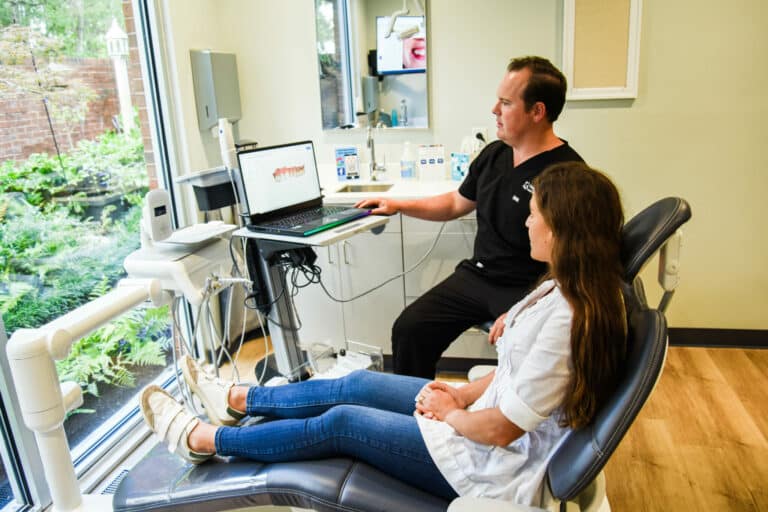If a Cavity Hurts, is it Too Late?
If you’ve ever experienced dental pain, you know how distressing it can be. It’s not uncommon for a cavity to cause discomfort, but does it mean it’s too late to address the issue?
This article delves into cavities and dental pain, exploring the signs, available treatment options, the importance of early intervention, and the consequences of delayed treatment.
By understanding these aspects, you can make informed decisions about your dental health.
Introduction
Cavities, also known as dental caries, are a common dental problem that affects people of all ages.
They are caused by the interaction between bacteria in the mouth and the sugars and starches in our food.
When left untreated, cavities can lead to tooth decay, infection, and loss. Dental pain is often associated with cavities, but it’s essential to determine whether it’s too late to address the issue.
Understanding cavities
To comprehend whether dental pain indicates a point of no return, it’s crucial to understand what cavities are and how they develop.
Cavities are areas of tooth decay that form when the outer layer of the tooth, called the enamel, breaks down from acid produced by bacteria.
Poor oral hygiene, a sugary diet, and a lack of regular dental care can contribute to the development of cavities.
Early signs of a cavity
Recognizing the early signs of a cavity is essential to address the issue promptly.
Some common indicators include:
- Tooth sensitivity to hot and cold temperatures
- A persistent toothache or sensitivity
- The presence of discoloration or visible holes in the teeth
If you experience any of these symptoms, it’s essential to consult a dentist for an accurate diagnosis and appropriate treatment.
Consequences of ignoring dental pain
Ignoring dental pain can have severe consequences. If left untreated, a cavity can progress, leading to tooth decay.
As the decay spreads, it can penetrate the tooth’s inner layers, including the dentin and pulp, which contain nerves and blood vessels. This progression can result in the following:
- Intense pain
- Increased sensitivity
- The formation of abscesses or infections
Treatment options for cavities
Fortunately, several treatment options are available for cavities that can help alleviate dental pain and restore the health of the affected tooth.
The appropriate treatment option will depend on the severity of the cavity.
One standard treatment for cavities is dental filling.
Dental fillings relieve pain and restore the tooth’s structure and function. This procedure involves removing the decayed portion of the tooth and filling the cavity with a dental material, such as composite resin or amalgam.
Root canal therapy may be necessary in more advanced cases where the decay has reached the tooth’s inner pulp.
This procedure involves removing the infected pulp, cleaning the root canals, and sealing them to prevent further infection. Root canal therapy aims to save the tooth and eliminate the source of dental pain.
In some cases, when the damage to the tooth is extensive and cannot be effectively treated with fillings or root canal therapy, extraction may be the last resort.
Tooth extraction involves removing the entire affected tooth. While this may seem drastic, it can prevent further complications and pave the way for tooth replacement options like dental implants or bridges.
When is it too late?
The question remains: when is it too late to address dental pain caused by a cavity?
The severity of the pain is not the sole determining factor. While mild to moderate pain may indicate that the cavity is still in the early stages, severe pain could suggest that the decay has progressed significantly.
However, it’s important to remember that pain thresholds vary from person to person, and it’s always best to consult a dental professional for an accurate assessment.
Delaying treatment for a cavity can have serious consequences. As mentioned earlier, cavities can lead to tooth decay, which, if left untreated, can result in infection, abscess formation, and tooth loss.
Timely intervention can help prevent these complications and preserve your oral health.
Importance of regular dental checkups
Regular dental checkups are crucial in maintaining optimal oral health and preventing dental pain associated with cavities.
Dentists can detect cavities in their early stages during routine examinations and take prompt action to address them.
Additionally, professional cleaning and preventive measures, such as fluoride treatments and dental sealants, can help prevent cavities from developing in the first place.
By scheduling regular dental visits, you can stay one step ahead of dental problems and ensure timely treatment, minimizing the risk of severe pain and complications.
Tips for managing dental pain at home
While it’s important to seek professional dental care for cavities, there are some measures you can take at home to alleviate dental pain temporarily.
- Over-the-counter pain relievers, such as acetaminophen or ibuprofen, can help reduce pain and inflammation.
- Rinsing your mouth with warm saltwater can also provide temporary relief.
- Applying a cold compress to the affected area can help numb the pain and reduce swelling.
However, it’s crucial to remember that these home remedies are not permanent solutions. They should be used temporarily until you can see a dentist for proper diagnosis and treatment.
Conclusion
Experiencing dental pain due to a cavity is not a situation to be taken lightly. Prompt action is key to preventing further complications and preserving your oral health.
Dental pain does not necessarily indicate it’s too late to address the issue, but delaying treatment can lead to severe consequences.
By recognizing the early signs of a cavity, seeking professional dental care, and maintaining regular checkups, you can stay proactive in preventing and treating cavities.
Remember, oral health is integral to your overall well-being, and taking care of your teeth is an investment in your long-term health and happiness.
FAQs
Can cavities heal on their own?
Cavities cannot heal on their own. Once the tooth structure is damaged, it requires professional dental treatment to remove and restore the decay. Ignoring cavities can lead to further decay and potential complications.
What can happen if I ignore dental pain?
Ignoring dental pain caused by a cavity can result in severe pain, abscesses, and tooth loss. It’s important to address dental pain promptly to prevent these complications.
Can a cavity cause tooth loss?
If left untreated, a cavity can eventually lead to tooth loss. As the decay progresses, it can weaken the tooth structure, making it more susceptible to fractures and infections. Timely treatment is crucial to save the tooth and prevent tooth loss.
How can I prevent cavities?
To prevent cavities, it’s essential to maintain good oral hygiene practices. This includes brushing your teeth at least twice a day with fluoride toothpaste, flossing daily, and using mouthwash. Additionally, limit your consumption of sugary foods and drinks, and visit your dentist regularly for checkups and professional cleanings.
Is it normal for a cavity to hurt?
Yes, it is normal for a cavity to cause pain or sensitivity. When the decay reaches the sensitive inner layers of the tooth, it can result in discomfort. The level of pain varies depending on the severity of the cavity. Consult a dentist to evaluate the extent of the decay and determine the appropriate treatment.
Don’t suffer from tooth pain and put your oral health at risk, schedule an appointment with Hoggard Family Dentistry today!
- Call us at: 910-762-0786
- Email us at: info@hoggardfamilydentistry.com
Hoggard Family Dentistry is located in Wilmington, NC, and we happily welcome folks from neighboring areas.




